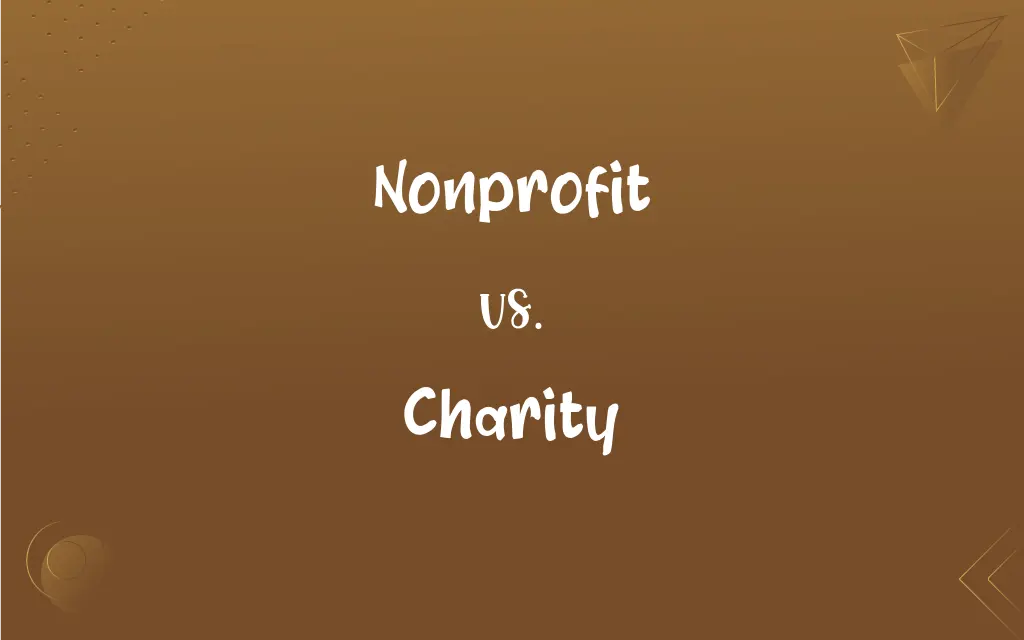Nonprofit vs. Charity: What's the Difference?
Edited by Aimie Carlson || By Janet White || Published on January 25, 2024
Nonprofit is a broad term for organizations not aimed at making profits, serving various purposes; Charity is a specific type of nonprofit focusing on philanthropic goals.

Key Differences
A nonprofit organization encompasses a wide range of entities that operate without the intent of distributing profits to owners or shareholders, instead reinvesting any surplus to further their goals. Charities, in contrast, are a subset of nonprofits, specifically focused on philanthropic aims such as poverty alleviation, education, and health.
While all charities are nonprofits, not all nonprofits are charities. Nonprofit entities can include museums, universities, and trade unions, which serve educational, professional, or cultural purposes. Charities are exclusively dedicated to charitable activities as defined by law and often enjoy tax-exempt status.
Nonprofits often have broader objectives, including advocacy, research, or community development. Charities primarily focus on direct support and relief work, engaging in activities that provide immediate aid to disadvantaged groups.
The governance of nonprofits can vary, including membership-based structures or boards. In the case of charities, they are typically governed by a board of trustees who oversee the charitable activities and ensure compliance with legal charitable status requirements.
Funding for nonprofits can come from memberships, sales, or services, while charities often rely more on donations, grants, and philanthropic contributions to carry out their charitable missions.
ADVERTISEMENT
Comparison Chart
Definition
A broad category of organizations not seeking profit
A type of nonprofit aimed at philanthropic goals
Scope
Can serve various purposes beyond charity
Specifically focuses on philanthropic activities
Examples
Museums, universities, trade unions
Food banks, homeless shelters, disaster relief
Primary Funding Sources
Memberships, sales, services
Donations, grants, philanthropic contributions
Legal Status
Varies, not all are tax-exempt
Often granted tax-exempt status for charity work
ADVERTISEMENT
Nonprofit and Charity Definitions
Nonprofit
An organization reinvesting surplus to achieve its goals, not distributing it as profit.
The art museum, a nonprofit, reinvests all earnings into new exhibits.
Charity
A system of voluntary giving to aid those in need.
Through charity, the community provided holiday meals for the homeless.
Nonprofit
An entity that functions without paying dividends to shareholders.
The educational nonprofit provides scholarships, not dividends.
Charity
An institution engaged in relief of the poor and disadvantaged.
The charity runs a soup kitchen in the city center.
Nonprofit
An organization exempt from paying income tax due to its social objectives.
The nonprofit research institute is tax-exempt due to its educational mission.
Charity
An entity focusing on philanthropic goals such as education, health, and welfare.
The charity funds scholarships for underprivileged students.
Nonprofit
An entity that operates without profit motive.
The local animal shelter operates as a nonprofit to help abandoned pets.
Charity
An organization operating for the public benefit with a specific humanitarian objective.
The charity provides free medical care in underserved regions.
Nonprofit
A group formed for purposes other than generating income for owners.
The environmental group, a nonprofit, focuses on conservation efforts.
Charity
An organization set up to provide help and raise money for those in need.
The charity organized a fundraiser for disaster relief.
Nonprofit
Not seeking or producing a profit or profits
A nonprofit organization.
Charity
Provision of help or relief to the poor; almsgiving.
Nonprofit
An organization, such as a charity, that does not seek or produce a profit
Donated money to local nonprofits.
Charity
Something given to help the needy; alms.
Nonprofit
Not seeking to produce a profit a financial gain.
Nonprofit
Ellipsis of nonprofit organizationan organization that exists for reasons other than to make a profit, such as a charitable, educational or service organization.
Nonprofit
Not commercially motivated
FAQs
Do charities have to be registered?
Yes, most charities must be registered and comply with legal requirements for tax-exempt status.
Are all charities nonprofits?
Yes, all charities are a specific type of nonprofit organization focused on philanthropy.
Can nonprofits participate in political activities?
Nonprofits can engage in some advocacy, but there are restrictions, especially for charities.
What defines a nonprofit?
A nonprofit is an organization not intended to make profits, often focused on social, educational, or cultural missions.
What legal responsibilities do nonprofits have?
They must comply with regulations regarding finance, governance, and reporting.
Can nonprofits make money?
Yes, nonprofits can earn money, but profits must be reinvested in the organization’s mission, not distributed to owners or shareholders.
Can a charity benefit a single individual?
Generally, charities aim to benefit the public or a significant segment of it, not specific individuals.
Do nonprofits pay salaries?
Yes, nonprofits can pay salaries to staff, but the compensation should align with their mission and resources.
How do charities demonstrate accountability?
Through transparent reporting, compliance with laws, and effective use of resources.
How is a nonprofit different from a for-profit entity?
Nonprofits do not distribute profits to owners/shareholders and focus on missions beyond profit-making.
Can charities sell products or services?
Yes, if the sales support their charitable mission and comply with tax-exempt status rules.
What roles do volunteers play in nonprofits?
Volunteers often provide essential services, support, and advocacy for nonprofit missions.
Are all nonprofits charitable in nature?
Not necessarily; some serve educational, cultural, or professional development purposes.
How do nonprofits get funding?
Funding can come from various sources like grants, donations, membership fees, or service sales.
Are donations to nonprofits tax-deductible?
Donations to qualified nonprofits and charities are often tax-deductible, but it varies by legal jurisdiction.
Can a nonprofit become a for-profit?
Transitioning to a for-profit requires significant legal and structural changes.
How do charities contribute to society?
They address social issues, provide relief, and contribute to the public good.
Can a nonprofit have political affiliations?
Nonprofits can advocate for issues but must remain nonpartisan, especially charities.
What is a 501(c)(3) organization?
In the U.S., it's a tax-exempt nonprofit, often charitable, educational, or religious.
What makes a charity effective?
Effective charities efficiently use resources to achieve significant impact in their focus area.
About Author
Written by
Janet WhiteJanet White has been an esteemed writer and blogger for Difference Wiki. Holding a Master's degree in Science and Medical Journalism from the prestigious Boston University, she has consistently demonstrated her expertise and passion for her field. When she's not immersed in her work, Janet relishes her time exercising, delving into a good book, and cherishing moments with friends and family.
Edited by
Aimie CarlsonAimie Carlson, holding a master's degree in English literature, is a fervent English language enthusiast. She lends her writing talents to Difference Wiki, a prominent website that specializes in comparisons, offering readers insightful analyses that both captivate and inform.































































